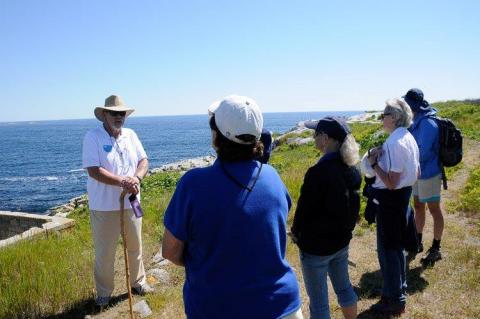SeaTrek Program focuses on climate change and ocean acidification
A SeaTrek Program is getting a much-needed update to reflect more current scientific knowledge about climate change and ocean acidification.
Educational programming has to keep up with our changing understanding of science and must be conveyed in a way that different age groups can readily grasp, explained Mark Wiley, marine educator for N.H. Sea Grant/UNH Cooperative Extension. The updated Climate Change SeaTrek Program offered by the UNH Marine Docents in the fall of 2016 will be aimed at two distinct audiences — grades 4-8 and adults — and thus will necessitate the development of different types of messaging to be effective, he said.

One of the UNH Marine Docents (L) teaches adults about the ocean.
The program will focus on helping students and adults become more comfortable with the terminology associated with climate change and ocean acidification, the potential impacts of climate change and the mitigation that needs to take place to help people and communities adapt, Wiley said.
Ocean acidification is a complicated topic; much of the Climate Change SeaTrek Program for grades 4-8 will be focused on helping students understand the basic concepts, including pH, how gasses can dissolve into water and some general discussion about the sequence of chemical reactions that take place to cause atmospheric carbon dioxide to change into carbonic acid in the ocean. The impacts on shellfish, coral reefs and other marine organisms will also be a focus of the programming.
For adults who are interested in learning about climate change and ocean acidification, the format of the SeaTrek Program will have to change a bit. Surveys conducted by one of Wiley’s previous interns indicated that public lectures are not the most effective way of conveying information to adults. The UNH Marine Docents are working on engaging the adult audiences via different formats, possibly including videos, social media or events. The program will also need a focus on local impacts to be effective, Wiley said.
Prior to publicly offering the Climate Change SeaTrek Program, the content will be vetted by Joe Salisbury, UNH research associate professor of oceanography and biogeochemistry, and Cameron Wake, UNH research professor of climatology and glaciology.